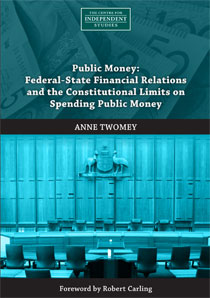
It is uncontroversial that federal-state financial relations need reform, but it is necessary to understand how we got to the current position and what constitutional constraints and principles are relevant to future reforms. Those who wrote the Commonwealth Constitution understood that they were handing over nearly three-quarters of all tax revenue to the Commonwealth, while the states would remain responsible for the vast bulk of spending. So they introduced constitutional mechanisms to force the transfer of most of the Commonwealth’s revenue to the states. This paper explains how those constitutional measures were thwarted in the first 10 years of federation and how the High Court supported these developments. But in a series of three cases since 2009, the High Court started to impose constitutional limits on the Commonwealth’s executive power, including its power to spend public money. This history provides the essential context for discussion of the reform of federal-state financial relations. Recognition that the High Court is now serious about enforcing limits on the Commonwealth’s expenditure powers may be the catalyst for achieving genuine, long-lasting reform. To ensure that such reforms are effective, those developing them must take into account the principles that have recently been applied by the High Court.
